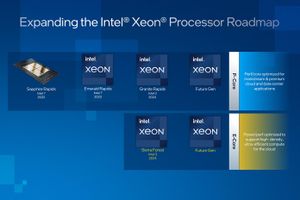From WikiChip
Difference between revisions of "intel/microarchitectures/emerald rapids"
m |
m |
||
| (2 intermediate revisions by the same user not shown) | |||
| Line 12: | Line 12: | ||
|successor=Granite Rapids | |successor=Granite Rapids | ||
|successor link=intel/microarchitectures/granite rapids | |successor link=intel/microarchitectures/granite rapids | ||
| − | |successor 2 | + | |successor 2=Sierra Forest |
| − | |successor | + | |successor 2 link=intel/microarchitectures/sierra forest |
|succession=Yes | |succession=Yes | ||
}} | }} | ||
Latest revision as of 17:17, 23 February 2023
| Edit Values | |
| Emerald Rapids µarch | |
| General Info | |
| Arch Type | CPU |
| Designer | Intel |
| Manufacturer | Intel |
| Introduction | 2023 |
| Process | Intel 7 |
| Instructions | |
| ISA | x86-64 |
| Succession | |
Emerald Rapids (EMR) is Intel's successor to Sapphire Rapids, a 7 nm microarchitecture for enthusiasts and servers.
History[edit]
Emerald Rapids was announced at the 2022 Intel Investor Meeting, it will succeed Sapphire Rapids in 2023.
Process Technology[edit]
Emerald rapids is planned to be manufactured on the Intel 7 process.
Facts about "Emerald Rapids - Microarchitectures - Intel"
| codename | Emerald Rapids + |
| designer | Intel + |
| first launched | 2023 + |
| full page name | intel/microarchitectures/emerald rapids + |
| instance of | microarchitecture + |
| instruction set architecture | x86-64 + |
| manufacturer | Intel + |
| microarchitecture type | CPU + |
| name | Emerald Rapids + |
